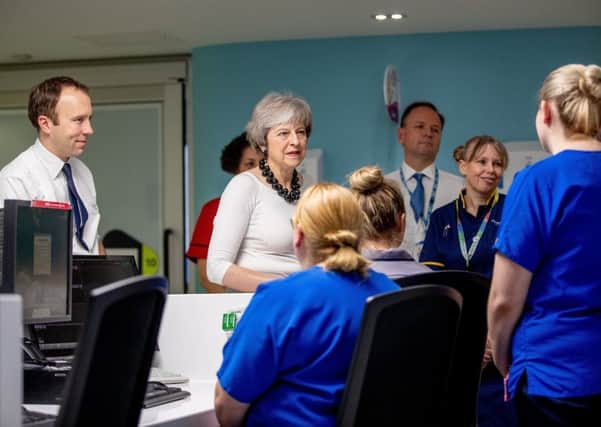Jayne Dowle: Why Skype is no substitute for an appointment with a GP


They’re part of the new 10-year plan for the NHS, unveiled by Prime Minister Theresa May, which promises an extra £20.5bn a year by 2023-24. Mrs May insists that investing in technology will “relieve pressure” on the system.
She might like to start by directing some of this technology into telephone answering services at GP surgeries. Never mind Skype. I’ve lost count of the frustrated people I’ve spoken to recently who have spent hours just trying to get someone to simply answer the phone, never mind manage to secure a doctor’s appointment.
Advertisement
Hide AdAdvertisement
Hide AdIt is clear that this lack of response is part of the fall-out from the last round of NHS reforms, in which GP practices were urged to conduct themselves as businesses.
But is technology really the answer? I understand the theory behind it. Indeed, I subscribe in part. For instance, I run pretty much everything to do with household management online from keeping an eye on the gas bill to paying for school trips. However, I’m fairly tech-savvy, I have a laptop and I shell out a fortune every month for a decent and consistent wifi signal. Not everyone is as fortunate.
And let’s remember that health is not a series of tick boxes. It’s complex and by its nature, very personal. Whilst one person may be happy logging onto Skype and chatting away to their doctor, another might find the whole experience confusing, even terrifying.
Advertisement
Hide AdAdvertisement
Hide AdAge is not the issue here. I know plenty of people in their 60s and 70s who are comfortable ‘Skyping’ their grandchildren and using Facebook, Instagram and other forms of digital interaction to communicate.
However, what makes me uncomfortable is this assumption that going online will not only solve a lot of problems, but will be embraced by all. Those in charge may be surprised to learn that some NHS patients struggle to deal with technology as it is.
For instance, I know a lady in her late 60s who suffers from a range of problems including diabetes and compromised mental health. She lives a normal life but requires extra support with certain matters.
Notwithstanding her complex needs, her doctor recently gave her a self-test device which checks and monitors her blood glucose levels. From what we could make out, she was then expected to text her daily results to the surgery.
Advertisement
Hide AdAdvertisement
Hide AdI’m sure the practice nurse explained in detail how it functions, but not much of it had actually registered with this lady. When we popped by to visit her, the stress and confusion were clearly adding to her anxiety.
This kind of thing rings alarm bells. There are far too many assumptions being made by NHS managers who appear to have little understanding of how the service works.
I’m not just talking about patient management and monitoring, but acute issues such as problems and emergencies.
I’ll give you another example. My 13-year-old daughter, Lizzie, has been attending the orthodontics department at our local hospital for almost two years now as her overcrowded teeth need intervention.
Advertisement
Hide AdAdvertisement
Hide AdIf you’ve ever had anything to do with a dental brace, you’ll know that they are temperamental things, given to springing apart and causing discomfort. Thankfully, the nurse gave us her direct line and told us to call her personally if we had a problem and she would make arrangements for us to pop in. We appreciate this very much. I can only imagine a Skype consultation between Lizzie and her orthodontics doctor.
I know that these latest proposals aren’t suggesting that hospital consultants will routinely advise their patients over the internet, but what concerns me is that this is the way that things are going.
It’s pertinent to point out here that Lizzie also needs a minor day-case operation on one particular stubborn tooth. She has been waiting for a date since last summer. Her doctor tells us that there at least 120 people on the waiting list before her.
Perhaps the new NHS 10-year plan should concentrate on bringing down such waiting lists instead of trying to distract us with whizz-bang innovations that nobody except highly-paid IT consultants really want.
Advertisement
Hide AdAdvertisement
Hide AdMeanwhile, there is simply no substitute for personalised and hands-on care. After all, if our dog or cat falls ill, we take it the vet where it is dealt with face to face. I know that this means paying for the privilege, but as taxpayers, the least we might expect from the NHS is to be treated with the same respect.